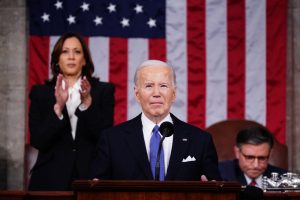
Editorial: Boston needs $$, non-profits must pay fair share
The fiscal chickens are coming home to roost in cities and states around the country tasked with housing the migrant influx.
Mayor Michelle Wu noted that our migrant crisis is expected to impact Boston’s budget next fiscal year as new arrivals continue to strain the adult shelter system and services are needed for children entering schools.
Wu, who may propose her budget to the City Council next month, did not get into specifics about how the crisis would impact spending in fiscal year 2025, which begins July 1. But one can guess: more money will be needed to deal with the migrant situation, and that money has to come from somewhere.
It doesn’t help that the city is facing a $1B budget shortfall thanks to all the empty office buildings around Boston.
The knee-jerk reaction would be to raise taxes on Boston residents. However, the city is sitting on a veritable goldmine of undertapped funding: the city’s tax-exempt colleges and universities.
The City Council raised the issue back in 2020, with then-Councilor Michael Flaherty calling for a hearing into the PILOT (Payment in Lieu of Taxes) program.
“Our tax-exempt institutions must pay their fair share,” said Flaherty.
It’s a great system — for colleges, universities, hospitals and other non-profits. Under the PILOT program, these nonprofits make voluntary payments, which amount to roughly 25% of what they would have paid in real estate taxes and are meant to “help to offset the burden placed on Boston taxpayers to fund city services for all property owners,” according to the city website, the Herald reported.
Property taxes represent 74% of the city’s revenue, but more than 50% of real estate in Boston is tax-exempt, according to City Councilor Liz Breadon, who last year lead a contingent of councilors pushing for an update to the program — which has operated under the same guidelines since 2012.
City Council President Ruthzee Louijeune, then a councilor, said “In a wealthy and prosperous city like Boston, we have to ensure that expanding economic success is felt by all of our residents, and the prosperity that we have as a city is one that everyone can share. Our wealthy and renowned nonprofits can afford to pay their fair share.”
Amen to that.
We’re past the point of free – or almost free – passes. Even if the migrant crisis wasn’t straining the city’s resources, there are too many financial variables to allow for sacred cows to decide how much they deign to pay in taxes.
We know what tuition costs at some of these institutions, and we’ve learned what some of our universities pay their teachers and administrators. No one is scraping by. No one, except, for Boston residents who need vital services and see city money stretch to provide for a continued inflow of migrants.
Assessing Department Commissioner Nicholas Ariniello noted last year that 47 nonprofits participating in the PILOT program weren’t meeting the full payment requested by the city.
In fiscal year 2022, collective payments from these private institutions were 75%, or roughly $92.4 million of the requested $123.5 million, Ariniello said.
Enough.
It’s unconscionable that non-profits in Boston continue to underpay the city, especially during these financially trying times. Pay up.
Editorial cartoon by Steve Kelley (Creators Syndicate)


